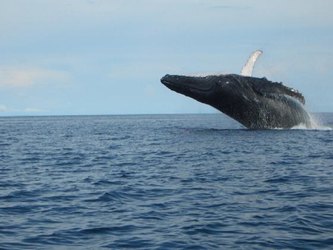June 8: The Most Important Day Of The Year For Humanity

Today is the day to celebrate our oceans and marine life – the heart and lungs of our planet that is now struggling so hard to stay alive because of the recent degradation by humans.
We should all just try to do one thing today in honour of our oceans: improve garbage habits – including reduction of use of plastics, Google Ocean Sustainability and become more educated – including Sylvia Earle’s YOUTUBE 2009 Award winning TED speech, consider changing your car to minimize carbon emissions, ride a bicycle to wherever you need to go, change all of your light bulbs to LED, contact your politicians to discuss their environmental views and impress upon them that it should be a priority, take stock of ways that YOU can reduce your human footprint. Reducing your carbon footprint is a process, and doesn’t happen overnight. We continuously need to alter the way we think and behave.
As a top predator, humans from the tropics to the poles have harvested all forms of marine life, from the smallest shrimp to the largest whales, from the ocean’s surface to its floor. The staggering volume of fish removed from our waters has had a ripple effect through all ocean ecosystems – 90 percent of our major predators have been taken from our oceans – including sharks and tuna. Fifty percent of our coral reefs are dead and 80 are in peril. Over 25 percent of our marine life depends on these precious coral reefs.
Yet the ocean continues to provide food for billions of people, and improved fishing practices in many places are leading to healthier marine-life populations. We’re slowly getting better at managing what we catch to keep it within the ocean’s capacity to replenish. But while we may be advancing in this battle, we’re losing the war with climate change and pollution.
In the coming years, the life of our oceans will be defined by what we put into them: garbage, carbon dioxide, nutrients washed from the land, diseases from aquaculture and land-based animals, invasive species, plastics, medications, contaminants, noise and ever-increasing marine traffic. We once incorrectly viewed our oceans as limitless storehouses of marine bounty and places to dump our garbage; now it’s clear they can’t handle this magnitude of destruction.
The Intergovernmental Panel on Climate Change’s recent report described how ingredients in the ocean’s composition are changing dramatically. Life in the seas is closely linked to factors in the immediate surroundings, such as temperature, acidity or pH, salinity, oxygen and nutrient availability. We now have over 400 DEAD Zones that we know of on our planet – meaning NO LIFE, NO OXYGEN. Importantly, the location of these dead zones line the shorelines of our continents! The largest is in one of our ocean’s most reproductive region in the Gulf of Mexico and is over 77,000 square miles.
The oceans now absorb one-quarter of the 30 billion tons of carbon that we send into the atmosphere each year. We are not only changing the currents and weather patterns on our planet but as well the acidic levels of the ocean composition is rising. That’s really bad news for organisms with calcium carbonate shells that dissolve in acidic conditions, as well as the entire ocean ecosystem.
By 2050 scientists predict that there will be no more fish if we continue to mismanage our oceans. Over half of a billion people in this world live within 100 kilometers of the ocean and depend on fish for their food and livelihood.
Human”s short-sighted, and somewhat selfish lifestyles have created this problem, and therefore we should be responsible to FIX it. Ironically, the ocean’s demise has taken place when the Hippies from the ’70s became Yuppies in the ’90s. Most of this has happened on OUR WATCH.
The oceans can live without US, but we can’t live without the oceans.
World renowned marine biologist Sylvia Earle concluded her 2009 award winning TED speech by saying, “We have 10 years to make this right. TEN years on behalf of the 10s of 1000s of years ahead on this planet.”
That was 5 years ago…
What will YOU do today on behalf of our oceans? I would love to hear from you…
